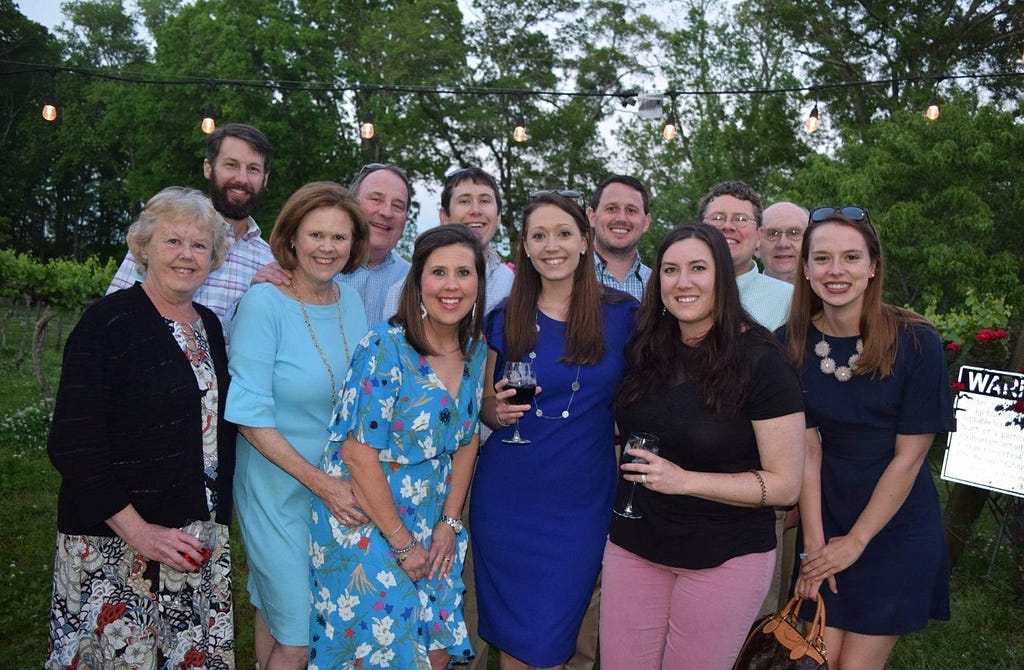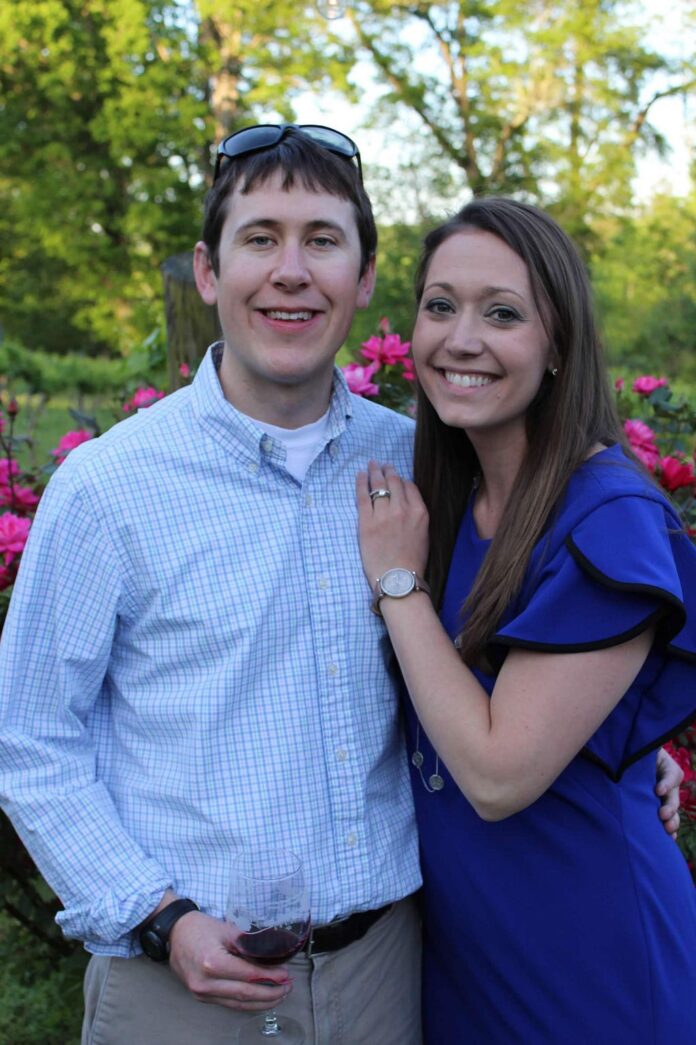Social Impact Heroes: Why & How Tia and Brian Jones of Testing for Tots Is Helping To Change Our World
Give yourself grace. Nobody has ever done the type of work we are doing in the Fabry disease community, so we are the only ones setting our goals. I used to get frustrated if I missed my own self-implemented deadlines, but I’ve realized that any progress forward is an achievement that wouldn’t have been reached without our work.
As part of my series about “individuals and organizations making an important social impact”, I had the pleasure of interviewing Tia and Brian Jones.
Tia Jones is a co-founder and leader of Testing for Tots, a nonprofit organization focused on enabling the early diagnosis of Fabry disease through its partnership with the Fabry Support & Information Group. Tia’s husband Brian, a practicing nephrologist in Asheville, NC, was diagnosed with Fabry disease during his last year of medical school. The couple is passionate about providing families impacted by the condition with access to critical information and resources to help ease its burden.
Thank you so much for joining us in this interview series! Can you tell us a story about what brought you to this specific career path?
Brian and I began dating when he was in medical school and hadn’t received his diagnosis yet. He had been experiencing strange symptoms since he was a toddler, often missing school because of gastrointestinal problems. He underwent two colonoscopies by the time he was 10 years old. His doctors concluded that he had irritable bowel syndrome (IBS). As an adult, Brian began experiencing hearing loss, kidney damage, heat intolerance and worsening neuropathy in his feet. He suspected that he might have diabetes, but his blood sugar was always normal. It wasn’t until he read a sentence about Fabry disease on a slide deck during a medical school lecture that he heard about the condition. He received his official diagnosis while we were in an airport taxi to leave for our honeymoon.
Fabry disease is caused by a genetic mutation that results in a deficiency of the lysosomal enzyme alpha-Gal A. As a result, a fatty substance builds up in the body, damaging many organs including the heart, kidneys, and nervous system. A number of complications can result, including heart abnormalities, chronic pain, strokes, kidney damage, an inability to sweat, and gastrointestinal difficulties. The symptoms of Fabry disease are varied and the condition manifests differently in each patient, meaning that many patients wait years before being correctly diagnosed.
At first, the diagnosis turned both of our worlds upside down. We felt like we needed to restructure our lives to accommodate Brian’s infusion treatments and manage his care. One of the key things we learned about during that time was the critical importance of access to diagnostic and treatment resources. In 2018, we established Testing for Tots, a nonprofit organization that aims to empower families impacted by Fabry disease. Our initial goal was to sponsor a small grant to contribute to Fabry disease diagnostic research, but the organization quickly grew.
Can you share the most interesting story that happened to you since you began leading your company or organization?
We first began talking about establishing Testing for Tots around the same time that we relocated to Minnesota for Brian’s residency program and he began undergoing infusion treatments. We learned that at that time, certain states including Minnesota did not allow pharmaceutical companies to provide financial assistance to patients undergoing infusion treatments. This placed a huge financial burden on us. Brian decided to contact one of the Minnesota state representatives at the time, who worked to amend the state’s legislation and allow pharmaceutical companies to provide infusion-related financial assistance within a few months. This might be the most impactful thing we’ll ever do in our lives because the amendment helped people with any disease that requires infusion therapy, not just those with Fabry disease.
It has been said that our mistakes can be our greatest teachers. Can you share a story about the funniest mistake you made when you were first starting? Can you tell us what lesson you learned from that?
This wasn’t really a mistake, but when we first started Testing for Tots, I tried to avoid learning about Fabry disease because it directly impacted my life. I thought that I could organize events and raise money without knowing anything about how the condition can impact people, but I was wrong. I’ve learned that in order to be able to speak to people about our work, raise funds and be a respected advocate, I have to know everything there is to know about Fabry disease, even if it makes me concerned about the health of my husband and family members.
Can you describe how you or your organization is making a significant social impact?
Since we began our work about six years, ago, we have made progress to include Fabry disease in state newborn screening panels in Nebraska, Colorado, Utah, Georgia and New Mexico. We are currently lobbying for legislative changes in Massachusetts and South Carolina that would enable Fabry disease screenings for newborns as well. To date, we have raised almost $200,000 to support these efforts.
Can you tell us a story about a particular individual who was impacted or helped by your cause?
We’ve met many families with children who were diagnosed with Fabry disease because of our newborn screening efforts. I recently spoke with a mom who was recently diagnosed with the condition along with her three children. She was understandably overwhelmed by all of the information she was given, so Brian and I have been helping her navigate which specialists to make appointments with and what treatment options might best fit her and her children’s lifestyles. After speaking with her, she told me that she was able to sleep peacefully for the first time in weeks. As a mother myself, I understand the value of a good night’s sleep and how one’s worries about their children can keep them awake all night. It felt so meaningful to be able to give her peace of mind.
Are there three things the community/society/politicians can do to help you address the root of the problem you are trying to solve?
1. It would be extremely helpful to the newborn screening initiative if governments and elected officials included funding in budgets to help laboratories process screening samples. Labs are often willing to perform screenings but are constrained by resource limitations.
2. Laboratories can make testing and newborn screening much more accessible and less expensive by using current standardized tests, as opposed to developing personalized panels.
3. Another change that can be made by laboratories and healthcare institutions is to use all of the screenings that are currently available on standard assays. For example, when there are six disease screenings on an assay, make sure to complete all six screenings.

How do you define “Leadership”? Can you explain what you mean or give an example?
To me, a leader is supposed to help create and embody an organization’s core values. The value I resonate the most with is inspiration. As a leader of a nonprofit, we rely on volunteers and community members to help us progress. If we can’t inspire our team to jump in and understand why our mission is important, we will never be able to move forward.
What are your “5 things I wish someone told me when I first started” and why. Please share a story or example for each.
I wish I knew how big our organization and mission would become. When we started Testing for Tots, I expected that I would organize a fundraiser and give the money that we raised to another organization that would do the advocacy work. I learned that it takes passion to drive progress, and that’s something I could never outsource.
Having a strategic plan and a good team around you are two keys to success.
Don’t limit your expectations of what you can accomplish. You never know what you might achieve.
Find like-minded people and partner with them to achieve common goals, even if they aren’t exactly the same. When you are trying to build a community of people who are living with one rare disease, the community is going to be small because the patient population is small. If you join forces with other small rare disease communities, you can make a much bigger impact.
Give yourself grace. Nobody has ever done the type of work we are doing in the Fabry disease community, so we are the only ones setting our goals. I used to get frustrated if I missed my own self-implemented deadlines, but I’ve realized that any progress forward is an achievement that wouldn’t have been reached without our work.
You are a person of enormous influence. If you could inspire a movement that would bring the most amount of good to the most amount of people, what would that be? You never know what your idea can trigger. 🙂
My biggest goal is to see Fabry disease added to the Recommended Uniform screening panel (RUSP). Many states have RUSP alignment legislation but it can take 3–5 years to complete the process. While the screening test itself comes at a negligible cost, the follow-up required for those who test positive does not. Genetic counseling is expensive, and its hard to get state governments to agree to fund this care.
Can you please give us your favorite “Life Lesson Quote”? Can you share how that was relevant to you in your life?
There is a quote from the Book of Esther, “Maybe you were made queen for just such a time as this.”
I often think of this quote and feel inspired by it. I have a background in engineering and Brian is a nephrologist. I believe that Brian’s diagnosis and our subsequent advocacy work was meant to be. Our skills and experiences allow us to help other people in this community, as long as we continue to say “yes” to the opportunities that come up for us.
Is there a person in the world, or in the US with whom you would like to have a private breakfast or lunch with, and why? He or she might just see this, especially if we tag them. 🙂
Dolly Parton. I hope she sees this one day. I grew up in east Tennessee in a small town where only 13 graduates from my class of 300 went to college. I am a first generation college student and became an officer in my company. Dolly’s focus on literacy and education in Tennessee is significant and I think it’s inspirational. It’s not about her being a musician, singer, or fashion icon, but what she has done for education that makes me admire her so much.
How can our readers further follow your work online?
To learn more about Testing for Tots and how to support the organization, visit our website and follow us on Facebook or Instagram. I can also be reached via email at tia.rosenbalm.jones@gmail.com.
This was very meaningful, thank you so much. We wish you only continued success in your great work!
Social Impact Heroes: Why & How Tia and Brian Jones of Testing for Tots Is Helping To Change Our… was originally published in Authority Magazine on Medium, where people are continuing the conversation by highlighting and responding to this story.


